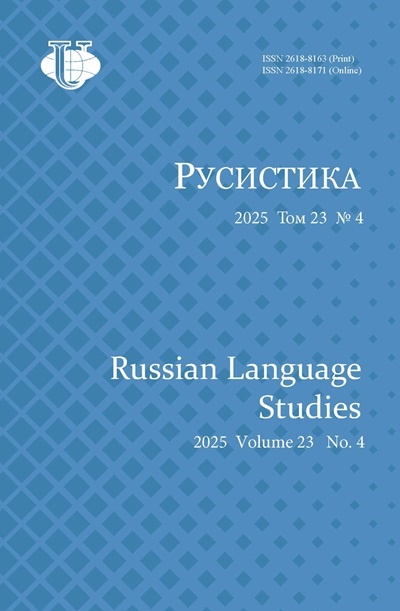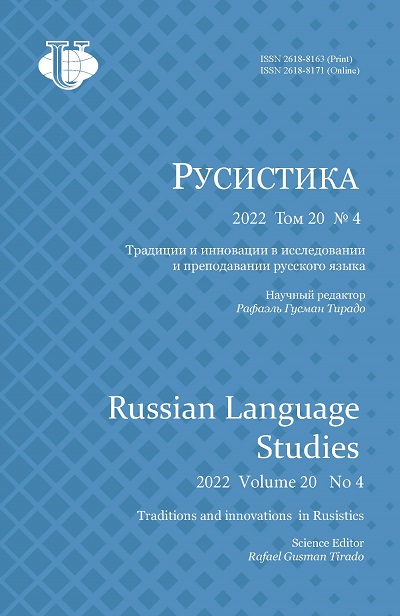Том 20, № 4 (2022): Традиции и инновации в исследовании и преподавании русского языка
- Год: 2022
- Статей: 8
- URL: https://journals.rudn.ru/russian-language-studies/issue/view/1615
- DOI: https://doi.org/10.22363/2618-8163-2022-20-4
Весь выпуск
Русский язык в мировом пространстве
Болгарский голос во всемирном хоре русистов
Аннотация
Всесторонне рассматривается вопрос о возникновении, становлении и развитии болгарской русистики как научного направления в исторической ретроспективе и в контексте ее современного состояния. Прослеживается влияние исторических, политических и социально-экономических факторов на преподавание русского языка в болгарской аудитории. Актуальной на современном этапе состояния отношений между Болгарией и Россией представляется цель предложить комплексное описание разнообразных направлений развития болгарской русистики и обучения русскому языку на фоне произошедших за последние три десятилетия изменений политической и социально-экономической ориентации государств. Исследование проводится на репрезентабельном материале научных публикаций и коллективных монографий, посвященных разнородным аспектам русистики (лингвистические, литературоведческие и прикладного характера). Используются традиционные методы анализа и оценки научной литературы, наблюдения, описания и обобщения педагогического опыта. Представлены данные Национального статистического института Болгарии о количестве школьников, изучающих русский язык на разных этапах обучения и в разных типах средних школ. Анализ официальных статистических данных показывает стабильную динамику интереса к русскому языку в болгарской аудитории независимо от наступивших в обществе перемен. Русский язык устойчиво занимает вторую позицию по количеству выбравших изучать его после английского языка. Выбору изучения русского языка способствует прагматическая установка учащихся, сочетание субъективных и объективных факторов. Специфическая особенность болгарской модели заключается в преподавании русского языка на всех уровнях: дошкольном, школьном, университетском и дополнительном образовании в соответствии с европейской политикой о непрерывном обучении в течение всей жизни.
 399-413
399-413


Актуальные проблемы исследований русского языка
Вербальная экспликация аксиологических констант русскоязычного фем-дискурса в контексте феномена киберактивизма
Аннотация
Рассматривается сопряжение базисных конституентов двух новых для современной русистики феноменов - явления интернет-активизма и языковой личности фем-активистки. Актуальность работы обусловливается объектом исследования, представляющим собой особые формы социолингвокультурных интеракций - дискурсивные практики фем-киберактивизма, которые, транслируясь в сетевой среде с целью осуществления общественно-политической деятельности, составляют сегодня значительную частью контента и оказываются одним из важнейших факторов формирования аксиологических детерминант российского общества. Цель исследования - выявление и системная характеризация лингвоспецифических признаков феминистских и профеминистких блогов, демонстрирующих как идеологические воззрения фем-движения, так и особенности языковой репрезентации тематического поля феминизма в аспекте представленности идиоэтнических черт языковой личности фем-активистки. Материалом исследования послужили авторские интернет-блоги фем-активисток, текстовые единицы тематических феминистских сообществ в социальных сетях, а также текстовые материалы общественных организаций. Использовались критический дискурс-анализ, функциональный анализ корпусов медиатекстов, комплексный компонентный и контекстуальный анализ языковой системы российской блогосферы, стилистический анализ изобразительных ресурсов русского языка, лингвопрагматический анализ речевых и коммуникативных актов и метод лингвокультурологических истолкований. Выявлено, что блогерский активизм имеет ряд характерных признаков, которые отражаются на его рече-коммуникативном наполнении. Главным назначением большинства блогов (особенно относящихся к категории личных, профеминистских) является акт самопрезентации, поэтому такой активизм нередко имеет индивидуальный, а не коллективный характер, авторы обычно не обозначают гражданско-политические цели, что сближает данный подкорпус фем-дискурса с неполитическими общественными практиками. Установлено, что авторы блогов редко используют конвенциональные языковые формы, традиционно присущие идеологизированным практикам, чтов свою очередь приводит к выработке новых коммуникативных стратегий и может иметь в будущем значительный социальный эффект. Доказано, что фем-киберактивизм, развивая «под определенным углом» смыслообразующий компонент фем-дискурса, представляющего собой критическую рефлексию женской субъектности, демонстрирует высокую степень вовлекаемости гражданского сообщества в определенные политические процессы. Дальнейшее рассмотрение феномена фем-киберактивизма может дать ответ на многие вопросы лингвокультурного и - шире - цивилизационного устройства российского общества.
 414-433
414-433


Лексические инновации с корнем пополам в русском гендерном интернет-дискурсе
Аннотация
Актуальность исследования обусловлена модификациями гендерных канонов российского общества, трансформациями русской гендерной картины мира, а также ростом значимости коммуникативного и лингвокультурного интернет-про-странства, которое является полем стихийных социальных, психологических и языковых экспериментов и репрезентативным источником информации об актуальных речевых практиках мужчин и женщин, говорящих по-русски. Цель исследования состоит в выявлении и описании особенностей образования, значения и функционирования не зафиксированных в словарях 23 гендерно ориентированных лексических инноваций, мотивированных наречием «пополам», указывающим на внеязыковую ситуацию разделения финансовой ответственности в паре. Исследование проведено на материале авторского корпуса контекстов употребления указанных единиц, который включает в себя 1750 речевых произведений неформальной интернет-коммуникации, опубликованных в 2012-2022 годах. Контексты корпуса получены методом сплошной выборки с помощью поисковой программы российской социальной сети VK и поискового сервиса Google. Применены методы словообразовательного, семантического, контекстуального и дискурсивного анализа, а также статистический метод. Установлено, что конституенты словообразовательного гнезда с мотивирующей основой пополам- используются для номинации, категоризации, характеристики и оценки лиц мужского и женского пола как участников романтических, интимных или семейных отношений, для обозначения и характеристики отношений в паре с точки зрения распределения финансовой ответственности между партнерами, а также обозначения действий и типов поведения участников таких отношений. Доказана устойчивая негативная оценочность инноваций и их преобладание в женской речи. Выявлено, что выполняемые единицами функции номинации, категоризации и негативной оценки субъектов и феноменов социального взаимодействия подчинены реализации основной идеологической функции, актуализированной в условиях борьбы традиционного патриархатного и нового эгалитарного гендерных контрактов. Установлено, что номинация лица мужского пола «пополамщик» не только является наиболее распространенным и значимым элементом словообразовательного гнезда, но и входит в число ключевых слов гендерного интернет-дискурса.
 434-448
434-448


Семантические доминанты новообразований 2020 года в аспекте кодирования действительности в русском языке
Аннотация
Актуальность исследования объясняется недостаточной изученностью феномена сквозных сем в новообразованиях одного временно́го среза с точки зрения интерпретирующей функции русского языка. Цель - проанализировать такие семы, выявленные в семантической структуре неологизмов коронавирусной эпохи, и охарактеризовать фрагмент языковой картины мира в кризисный для него период. Материалом исследования является окказиональная лексика, зафиксированная в российской медиасфере и тематически связанная одной предметной областью - пандемией 2020 года. Источник исследования - «Словарь русского языка коронавирусной эпохи» (проект ИЛИ РАН). Исследование выполнено в русле социолингвистики с использованием методики компонентного анализа семантики, словообразовательного и контекстного анализов. В ходе исследования выделялись тематические подгруппы; в каждой подгруппе выявлялись номинации окказионального характера; определялись средства выражения оценки (производящие основы - для сложных слов, словообразовательные форманты - для аффиксальных дериватов) и устанавливалась общая интерпретирующая сема (с учетом контекстного значения слова). На последнем этапе определялось общее количество лексем, связанных той или иной семантической доминантой. Данные представлены в обобщающей таблице, демонстрирующей в процентном соотношении долю представленности и в то же время степень значимости самой семантической доминанты в процессе языкового кодирования фрагмента действительности. В результате выявлены семантические доминанты, объединяющие окказионализмы разных авторов и демонстрирующие типовые оценки ситуации, связанной с COVID-19; определена степень частотности семантических доминант. Новизна исследования обусловлена спецификой проведенного семантического анализа: впервые на значительном гомогенном массиве словообразовательных дериватов выявляются общие семы, отражающие особенности эмоционального и психологического состояния русскоязычного общества.
 449-466
449-466


Лингвокультурология: теоретические и прикладные аспекты
Изменение семантики слова «дом» в русском языке первых десятилетий XX века
Аннотация
Актуальность исследования определяется необходимостью выявления изменений в семантике слова «дом» в языковом сознании общества, связанных с историческими, культурными, социально-политическими и экономическими преобразованиями. Описываются и анализируются изменения в семантике слова «дом» в языковом сознании общества Советской России и русского зарубежья в первые три десятилетия XX века. Цель исследования заключается в раскрытии семантики слова «дом» в первые три десятилетия XX века посредством анализа текстов художественных произведений писателей этого времени. Для достижения поставленной цели использовалась комплексная методика анализа лексического материала, включающая описательный метод, основанный на анализе словарных дефиниций, метод лингвостилистического анализа текстов художественной литературы. Материалом послужили статьи, содержащие определения слов «дом», «домашний очаг», представленные в основных толковых словарях русского языка XIX-XX веков и словарях новейшего времени, тексты художественной и мемуарной литературы. Новизна представленных материалов состоит в том, что впервые производится анализ изменения семантики слова «дом» с целью сопоставления отдельных участков языковой картины мира носителей русского языка в России и в эмиграции на фоне революции и в первые послереволюционные десятилетия. Языковое отражение такого ключевого понятия, как дом, на стыке двух исторических эпох - дореволюционной и постреволюционной - социально обусловлено и представлено как переломный момент в художественной прозе и мемуарной литературе первой половины XX века. Предполагается, что дальнейшее исследование семантики слова «дом» может быть связано с наблюдением над языком конца XX - начала XXI века.
 467-482
467-482


Методика преподавания русского языка как родного, неродного, иностранного
Аутентичные видеоматериалы как средство формирования русскоязычной коммуникативной компетенции испанских и нидерландских инофонов
Аннотация
Преподавание русского языка как иностранного (РКИ) вне языковой среды представляет особую сложность и требует внедрения современных методов в образовательный процесс для формирования необходимых коммуникативных и языковых компетенций студентов. При обучении аудированию на начальном этапе изучения иностранного языка большую роль играет активное использование аутентичных материалов как одного из основных требований коммуникативного подхода. Актуальность темы заключается в необходимости активного формирования навыков аудирования уже на начальном этапе изучения РКИ и оптимизации процесса самостоятельной работы. Цель исследования состоит в разработке комплекса видеоматериалов для учащихся нулевого уровня, направленных на развитие коммуникативной компетенции студентов. Для достижения данной цели использовался ряд методов: метод моделирования заданий, сравнительно-сопоставительный метод и метод наблюдения. Комплекс разработанных заданий апробирован в группах инофонов в возрасте от 20 до 45 лет в двух языковых центрах в Испании и Нидерландах на протяжении первого триместра. Упражненияс видеоматериалами разделены на шесть модулей и включают усвоенные на занятиях лексико-грамматические структуры (глаголы первого и второго спряжения, предлоги в/на, винительный и предложный падежи существительных). Результаты исследования показывают, что применение аутентичных материалов позволяет улучшить навыки аудирования, максимально приблизить образовательный процесс к ситуации живого речевого общения, мотивирует обучающихся и способствует усвоению новых грамматических и лексических единиц. Значительных различий по итогам выполнения итогового задания по аудированию в испанской и нидерландской группах не выявлено. Полученный негативный языковой материал связан с повышенным темпом речи, наложением голосов, детской речью, что будет учтено для дальнейшей разработки заданий по аудированию для учащихся начального уровня и публикации полного комплекса заданий для использования на занятиях РКИ.
 483-499
483-499


Лингводидактический потенциал семиотически неоднородных текстов в обучении русскому языку школьников Казахстана
Аннотация
Освещаются вопросы функционирования и описания семиотически неоднородных текстов в методике преподавания русского языка. Традиционные методы применения семиотически неоднородных текстов в организации образовательного процесса сохранят свое значение, но вместе с тем необходима трансформация научных подходов к анализу проблем, обусловленных рефлексивной природой, ситуативной изменчивостью цифрового контента в образовании. Цель работы - выявление и описание лингводидактического потенциала семиотически неоднородных текстов, используемых на занятиях по русскому языку в школах Казахстана. Применялись методы комплексного теоретического анализа научной и учебной литературы по семантически неоднородным текстам, а также обсервационного метода изучения и обобщения педагогического опыта учителей русского языка в школах Алма-Аты. В качестве источников для исследуемого материала выбраны печатные семиотически неоднородные тексты из серии учебников по русскому языку и литературе общеобразовательной школы с казахским языком обучения (7, 8, 9 классы), а также видеоролики литературных миниатюр Е. Посашковой, размещенные на YouTube-канале. Доказано, что раскрытие лингводидактического потенциала семиотически неоднородных текстов осуществляется на основе системы специальных заданий и упражнений. Предложена авторская методика работы с семиотически неоднородными текстами на занятиях по русскому языкув школах Казахстана. Выявлен их лингводидактический потенциал, направленный на запоминание основного содержания текста, развитие навыков основных видов речевой деятельности и аспектов языка, воздействие на воображение, эмоции, подсознание обучающихся, обеспечение продуктивности коммуникации в новой информационно-коммуникативной среде. Перспективным для исследования является изучение функциональной нагруженности вариативных компонентов семиотически неоднородных текстов, их гипертекстовых связейи реализации в практике преподавания русского языка в казахстанских школах.
 500-514
500-514


Обучение уйгуров русскому языку в вузах КНР: педагогический инструментарий национально ориентированной методики
Аннотация
Актуальность исследования определяется поиском компромисса в обучении уйгуров русскому языку в вузах КНР. Имея особые ментальные, культурные и языковые черты, уйгуры обучаются по программам, ориентированным только на китайскую аудиторию и не учитывающим особенности национальных меньшинств. Цель исследования - рассмотреть основы национально ориентированной методики обучения уйгуров русскому языку в вузах КНР и предложить ее педагогический инструментарий. Материалами послужили труды ученых по национально ориентированному обучениюи методике преподавания РКИ, работы по истории, культуре уйгурского народа, а также анкетирование уйгурских студентов и преподавателей, обучающихся и работающихв Пекинском государственном университете. Использовались методы комплексного теоретического анализа и опросно-диагностический. Проанализирован культурно-исторический путь уйгуров, обусловивший их ментальные особенности, которые необходимо учитывать при разработке национально ориентированной методики. Результаты анкетирования позволили выявить специфику обучения уйгуров русскому языку и охарактеризовать основные трудности, с которыми сталкиваются студенты в вузах КНР. Определены пути решения обозначенных трудностей путем разработки национально ориентированной методики обучения уйгуров русскому языку и предложен ее педагогический инструментарий. Перспективой исследования является апробация предложенных основ национально ориентированного обучения уйгуров русскому языку в вузах КНР и их дальнейшая разработка.
 515-530
515-530















